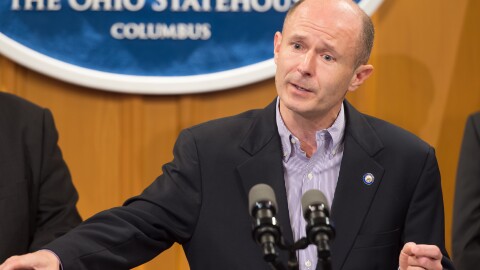After 17 days of overtime budget negotiations, lawmakers in the Ohio House and Senate have reached a $69 billion two-year spending deal.
The plan was approved Tuesday evening by a conference committee, in a room packed with advocates, lobbyists and legislative staff. The General Assembly is expected to vote on the plan Wednesday.
One of the biggest fights between the House and Senate boiled down to the small business income tax deduction. The plan keeps the $1.2 billion income tax cut for small businesses and pass-through entities, which is what the Senate wanted.
The House originally proposed bringing that income tax deduction from the first $250,000 earned down to the first $100,000.
The budget deal also cuts personal income taxes by 4%, less than proposed by either the House or Senate. It would also eliminate the bottom two tax brackets.
The only change made to the small business income tax deduction is that it excludes lawyers and lobbyists.
Other agreements made in the budget deal include:
- The Motion Picture Tax Credit will stay in place at $40 million a year, but recipients must be registered as Ohio businesses.
- It requires the Ohio Department of Medicaid to create a single, statewide pharmacy benefit manager to negotiate prescription drug benefits.
- A moratorium will be placed on new academic distress commissions, which are created to take over failing school districts. The plan retains the current academic distress commissions in Youngstown, Lorain, and East Cleveland.
- “Crisis pregnancy centers” will receive $7.5 million over a two-year span. Abortion rights advocates say these centers provide false information to their patients.
- The 2020 presidential primary will be held on March 17, St. Patrick’s Day, despite concerns raised by Democrats that the festivities could interfere with the election and drive down turnout.
- Educational wraparound services will receive $550 million, with additional funding for private school scholarships and fast-growing school districts whose funding has been capped.
Lawmakers passed a temporary budget deal after they failed to reach a final plan on the original deadline of June 30, at which point the fiscal year ends and a new spending plan is needed.
A full chamber vote is scheduled for the Ohio House and Senate on Wednesday, just hours before the interim budget is set to expire. Gov. Mike DeWine can veto provisions he doesn't approve.
The state has been operating under a 17-day temporary budget this month since the Legislature missed the original deadline June 30 for the first time since 2009.
The Associated Press contributed to this story.






